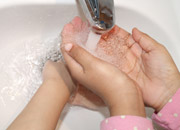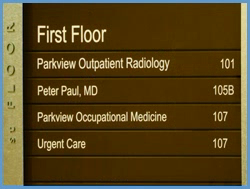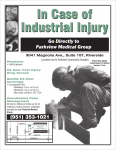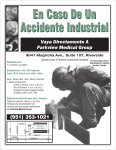admin
Coming Soon – Rapid Tests
Rapid Tests for Corona Virus will be available from Parkview Medical Group in the near future. Stay tuned!
Hand Washing
Get the upper hand over germs
We can’t say it enough. Hand washing is by far the best way to prevent viruses and bacteria from spreading — and to keep you and your kids from catching whatever bugs are going around.
How to wash your hands
A little sprinkle of water isn’t going to get rid of viruses and bacteria. Wash thoroughly with soap and water:
- Wet your hands and apply soap.
- Rub your hands together and scrub them, front and back. Don’t forget your wrists and under your fingernails.
- Rinse your hands well under running water.
- Dry your hands using a paper towel or air dryer. If you’re drying with a paper towel, use it to turn off the faucet.

How long should you scrub? About 15 to 20 seconds, about the time it takes to sing “Happy Birthday” twice through. Teach this to your kids — it’s a fun way to get them to wash properly.
How to use gel sanitizers
Can’t get to a sink? Use alcohol-based gel hand sanitizers or hand wipes instead. Carry one or both with you, and keep them in your car or purse. If you’re using a gel sanitizer, you don’t need to use water. The alcohol in the gel kills viruses and bacteria on your hands. Here’s how to use a gel effectively:
- Apply a nickel-size amount of product to the palm of one hand.
- Rub the gel over all over your hands and fingers for about 20 seconds.
- Keep rubbing until your hands are dry.
When should you wash your hands?
During the fall and winter cold and flu season, wash your hands often, and make sure you wash if you’ve come into contact with viruses, such as when:
- you’ve blown your nose, coughed, or sneezed
- someone in your home, or that you’re caring for, is sick
- you’ve come home from school, work, shopping, or a social event
But good hand hygiene will protect you all year round from other viruses and bacteria, too, so don’t forget to wash when:
- you’ve prepared poultry, raw eggs, meat, or seafood, which can carry bacteria that cause food poisoning
- you’ve used the bathroom or changed a diaper, which can expose you to infectious diseases such as salmonella and hepatitis A
- you’ve touched an animal or handled animal waste
- you’ve touched garbage or anything else that could be contaminated, such as a cleaning cloth, drain, or soil
- you’re about to or just finished treating a cut
Travel safe
If you’ve traveled, you know that shuttling from one destination to another involves lots of people and public places, which means exposure to countless viruses and bacteria. That’s why it’s as important to stick to the same healthy habits when you travel that you practice when you’re at home:
- Wash your hands often.
- Use a hand sanitizer.
- Cough or sneeze into a tissue or your elbow.
Stop viruses from spreading
Each year, you’re up against 200 or more cold and flu viruses. Get your flu shot, and take simple, effective steps to help protect yourself and others.
Healthy Habits
- Keep ’em clean. Hand washing is one of the most important things you can do to keep from getting and spreading colds and the flu. Using plain soap and warm water is as effective as using antibacterial soap. Carry an alcohol-based hand gel to use when you can’t wash.
- Stay healthy. Eating well (including antioxidant-rich fruits and vegetables), getting plenty of rest, managing stress, and exercising can help you resist infection. Children and adults (especially seniors 65 or older) who have a chronic health condition or weakened immune system should get a pneumonia vaccination.
- Kick the habit. If you smoke, we have a variety of resources to help you quit. Keep your children away from secondhand smoke. It’s bad for their health and can cause cold-like symptoms.
- Breastfeed your baby. This will help keep your baby healthy and reduce the risk of colds and ear infections.
Practices to Always Follow
- Cover your cough. Cold and flu viruses are spread through the air. Cough or sneeze into a tissue or your sleeve to trap the virus. If you cough into your hands, wash them as soon as you can.
- Clean your home. A sick person can spread germs by touching counter tops, telephones, toys, cups, or bathroom sinks. Find out how to keep a cold and flu-free kitchen.
- Use disposable tissues. Viruses can live on cloth handkerchiefs, so use — and throw away immediately — disposable tissues to reduce spreading your illness to others.
- Avoid touching your face. Try not to rub your eyes, nose, or mouth. Germs often spread this way.
- Try not to pass it on. Stay home and rest when you’re sick. Really need to go out? Be careful not to expose others. If you have a fever, wait at least 24 hours after your fever is gone without the use of a fever-reducing medicine.
New Website
We have a new website at Parkview Medical Group
You might have noticed some changes around here. We’ve launched our new website in preparation of keeping you more informed and to better serve you with more avenues of communication.
You may also notice more changes in the near future as we grow into and better optimize things here. So stay tuned!
Corona Virus
Stay home, stay safe, keep your family safe.
Get tested.
We’re here for you when you need us!
Form Downloads Available
You can find various forms available for download in our FORMS page. These could save you time when you need to come see us. Simply download them, print them, fill them out before arriving and you will be ready to go faster than ever!
Why get a flu shot?
Protect yourself and your family
The flu is more serious than the common cold, so do everything you can to prevent it. A flu shot is your best defense. The vaccine is safe, won’t make you sick, and generally has few side effects. The flu virus changes often, and the protection from the vaccine only lasts for about a year. That’s why you should get a flu shot every year, preferably in the fall.
Who should get the flu shot?
The CDC recommends everyone 6 months and older get a flu vaccination every year. The flu shot helps prevent you from getting the flu and from spreading it to others. Even healthy people can develop serious complications or even die from the flu — so protect yourself and your loved ones by getting vaccinated.
Vaccination is especially important for:
- people 50 years and older
- children 6 months through 4 years old
- women who are or will be pregnant during flu season
- people with chronic medical conditions or weakened immune systems
- people who live in nursing homes and other long-term care centers
- health care workers
- people who live with or care for anyone at high risk for flu-related complications
Complications of flu can include bacterial pneumonia, ear infections, sinus infections, dehydration, and worsening of chronic medical conditions, such as congestive heart failure, asthma, or diabetes.
Why kids should get a flu shot
Children can spread the flu easily to adults and other children. Getting vaccinated also helps protect infants (who cannot receive a flu shot), pregnant women, the elderly, and people with chronic conditions.
Make sure your children get all recommended vaccinations on time.







